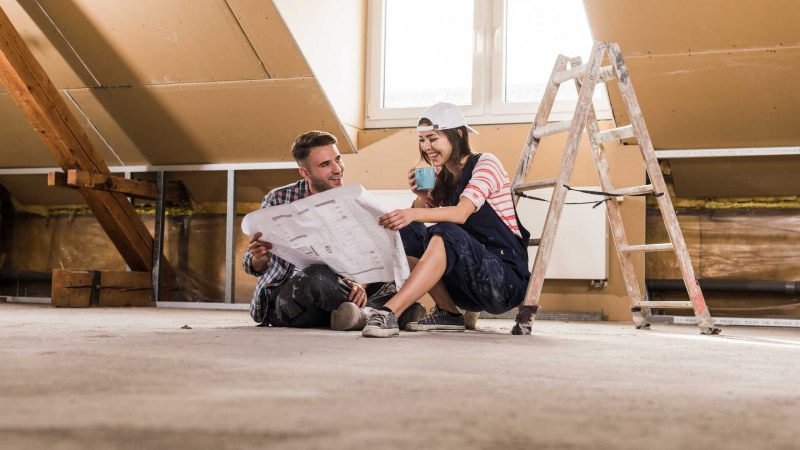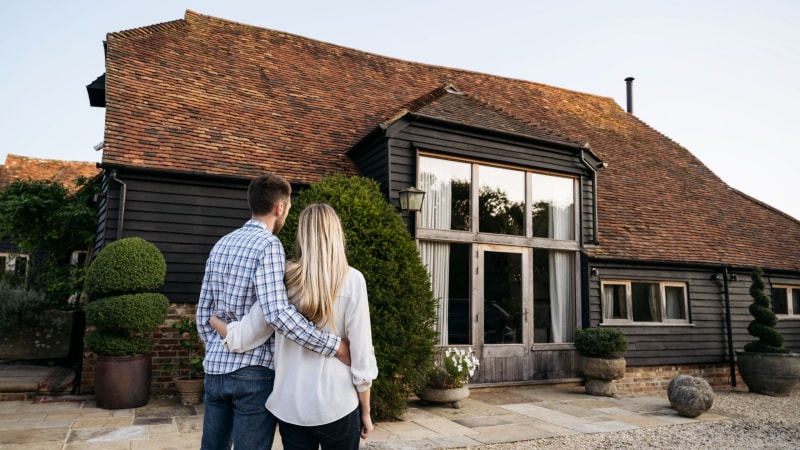How much does it cost to build a house?

Quick insights
- Building a house offers customization but can involve higher costs, complex financing and a longer timeline than buying.
- The cost to build varies widely by location, materials and labor, with significant administrative and planning requirements.
- New homes may appreciate better and have lower repair costs, but unexpected expenses and delays are common.
Building a house can give you the room to imagine and create the home of your dreams—perhaps down to every door handle and floorboard. If you choose to build a home, keep in mind that the price will depend on the location, quality and the cost of labor.
The cost of building a house vs. buying
The cost of building a house versus buying one can vary greatly depending on your location, materials and labor. Building a home usually involves expenses for land, permits, materials and labor, as well as additional administrative work.
Building from scratch can cost more per square foot and take longer to complete, while buying an already built home may offer quicker occupancy and fewer unexpected costs. For the most accurate estimate, research local prices in your target market and consider all associated expenses.
Home-building costs you might expect
Before you can start building your dream home, it's important to understand what goes into the total cost. The price to build a house can vary widely depending on the location, size, materials and finishes you choose.
Here’s a general breakdown of where your construction dollars may go:
- Land and site preparation: Purchasing the lot, clearing trees, grading and preparing the land.
- Foundation: Pouring the slab or full basement foundation can make for a high cost depending on the type and soil conditions.
- Framing: Building the home’s structure (walls, supports, floors and roof).
- Exterior finishes: Roofing, siding, doors and windows often add up based on materials and design.
- Major systems: Plumbing, electrical and HVAC installations are essential, and costs can vary based on home size and layout.
- Permits and fees: Building permits, utility hookups and inspections.
Actual costs can vary widely by location, materials and builder rates.
Average cost to build a house
Here are average cost ranges for houses by square footage:
- 800: $48,000–$88,000
- 1,000: $60,000–$110,000
- 1,500: $90,000–$165,000
- 2,000: $120,000–$220,000
- 2,700: $162,000–$297,000
- 3,000: $180,000–$330,000
- 4,000: $240,000–$440,000
- 5,000: $300,000–$550,000
Costs will vary depending on many factors, such as location, architect, contractors, materials, permits and more.
The pros of building your home
- The main benefit of building your own home is the customization. With a custom build, you could design what you want from the ground up. With a production home, you can have some say in the style of the home but are essentially choosing from a menu cooked up by a builder.
- Whether you decide on a custom built home or a production home, your home may appreciate better than an older home. Newer homes can be valued higher than older homes. This is partly from buyers’ perceptions but also because of the aesthetics, lower potential repair costs and energy efficiency.
- Newer homes have updated cooling/heating systems and plumbing, which can carry a large price if they are old and need repairs.
The cons of building your home
- Building your own home can be harder or more expensive to finance. If you need a construction loan, the terms tend to differ from those of conventional mortgage loan options.
- Additional costs may come up as you build, but this can be alleviated by a good builder and constant communication.
- House construction takes an average of about seven to eight months to complete. This can take over a year depending on the size of the home and any delays with permits or construction.
Loans that may turn your dream home into a reality
A construction loan and a mortgage are some of the loans that may be required when building your own home. The construction loan is a short-term loan that is necessary for the building of the house. Once the house is built, you would apply for a mortgage on the house.
Types of construction loans:
- Construction-only loan: A short-term loan meant to cover about a year for construction. Chase does not offer this product.
- Construction-to-permanent loan: Similar to the construction-only, the loan covers the construction for about a year with interest only payments but then converts into a permanent mortgage once the house is built. Chase does not offer this product.
- Renovation loan: Used for home renovations. Allows the homeowner to purchase and renovate their home at the same time under one monthly payment. Chase does not offer this product.
- Owner-builder loan: If you have the credentials to do so, this loan allows you to act as your own contractor. Chase does not offer this product.
- End loans: Lower interest, long term loan that helps repay construction loans upon completion of the project. Chase does not offer this product.
In conclusion
Whether you're buying or building a house, you may have some idea of what you’re looking for. If you have a vision and the money to build new construction, then exploring the option may be worthwhile.
As a future homeowner, the prospect of designing your dream home can be extremely enticing and, in some cases, very doable. There’s a lot to know before deciding on an already built home, a production home or a custom-built home.



